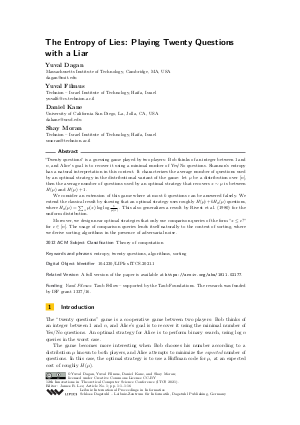The Entropy of Lies: Playing Twenty Questions with a Liar
Authors Yuval Dagan, Yuval Filmus, Daniel Kane, Shay Moran
-
Part of:
Volume:
12th Innovations in Theoretical Computer Science Conference (ITCS 2021)
Part of: Series: Leibniz International Proceedings in Informatics (LIPIcs)
Part of: Conference: Innovations in Theoretical Computer Science Conference (ITCS) - License:
 Creative Commons Attribution 3.0 Unported license
Creative Commons Attribution 3.0 Unported license
- Publication Date: 2021-02-04
File

PDF
LIPIcs.ITCS.2021.1.pdf
- Filesize: 497 kB
- 16 pages
Document Identifiers
Related Versions
-
A full version of the paper is available at https://arxiv.org/abs/1811.02177.
Subject Classification
ACM Subject Classification
- Theory of computation
Keywords
- entropy
- twenty questions
- algorithms
- sorting
Metrics
- Access Statistics
-
Total Accesses (updated on a weekly basis)
0Document
0Metadata
Abstract
"Twenty questions" is a guessing game played by two players: Bob thinks of an integer between 1 and n, and Alice’s goal is to recover it using a minimal number of Yes/No questions. Shannon’s entropy has a natural interpretation in this context. It characterizes the average number of questions used by an optimal strategy in the distributional variant of the game: let μ be a distribution over [n], then the average number of questions used by an optimal strategy that recovers x∼ μ is between H(μ) and H(μ)+1. We consider an extension of this game where at most k questions can be answered falsely. We extend the classical result by showing that an optimal strategy uses roughly H(μ) + k H_2(μ) questions, where H_2(μ) = ∑_x μ(x)log log 1/μ(x). This also generalizes a result by Rivest et al. (1980) for the uniform distribution. Moreover, we design near optimal strategies that only use comparison queries of the form "x ≤ c?" for c ∈ [n]. The usage of comparison queries lends itself naturally to the context of sorting, where we derive sorting algorithms in the presence of adversarial noise.
Cite As Get BibTex
Yuval Dagan, Yuval Filmus, Daniel Kane, and Shay Moran. The Entropy of Lies: Playing Twenty Questions with a Liar. In 12th Innovations in Theoretical Computer Science Conference (ITCS 2021). Leibniz International Proceedings in Informatics (LIPIcs), Volume 185, pp. 1:1-1:16, Schloss Dagstuhl – Leibniz-Zentrum für Informatik (2021)
https://doi.org/10.4230/LIPIcs.ITCS.2021.1
BibTex
@InProceedings{dagan_et_al:LIPIcs.ITCS.2021.1,
author = {Dagan, Yuval and Filmus, Yuval and Kane, Daniel and Moran, Shay},
title = {{The Entropy of Lies: Playing Twenty Questions with a Liar}},
booktitle = {12th Innovations in Theoretical Computer Science Conference (ITCS 2021)},
pages = {1:1--1:16},
series = {Leibniz International Proceedings in Informatics (LIPIcs)},
ISBN = {978-3-95977-177-1},
ISSN = {1868-8969},
year = {2021},
volume = {185},
editor = {Lee, James R.},
publisher = {Schloss Dagstuhl -- Leibniz-Zentrum f{\"u}r Informatik},
address = {Dagstuhl, Germany},
URL = {https://drops.dagstuhl.de/entities/document/10.4230/LIPIcs.ITCS.2021.1},
URN = {urn:nbn:de:0030-drops-135400},
doi = {10.4230/LIPIcs.ITCS.2021.1},
annote = {Keywords: entropy, twenty questions, algorithms, sorting}
}
Author Details
Funding
- Filmus, Yuval: Taub Fellow - supported by the Taub Foundations. The research was funded by ISF grant 1337/16.
References
-
Martin Aigner. Finding the maximum and minimum. Discrete Applied Mathematics, 74:1-12, 1997.

-
Javed A. Aslam and Aditi Dhagat. Searching in the presence of linearly bounded errors. In Proceedings of the 23rd annual Symposium on Theory of Computing (STOC'91), pages 486-493, 1991.

-
A. Bagchi. On sorting in the presence of erroneous information. Information Processing Letters, 43:213-215, 1992.

-
Elwyn R. Berlekamp. Block coding for the binary symmetric channel with noiseless, delayless feedback, pages 61-85. Wiley, New York, 1968.

-
R. Sean Borgstrom and S. Rao Kosaraju. Comparison based search in the presence of errors. In Proceedings of the 25th annual symposium on theory of computing (STOC'93), pages 130-136, 1993.

-
Mark Braverman and Elchanan Mossel. Noisy sorting without resampling. In Proceedings of the nineteenth annual ACM-SIAM symposium on Discrete algorithms, pages 268-276. Society for Industrial and Applied Mathematics, 2008.

-
Yuval Dagan, Yuval Filmus, Ariel Gabizon, and Shay Moran. Twenty (simple) questions. In 49th ACM Symposium on Theory of Computing (STOC 2017), 2017.

- Yuval Dagan, Yuval Filmus, Daniel Kane, and Shay Moran. The entropy of lies: playing twenty questions with a liar. arXiv preprint, 2018. URL: http://arxiv.org/abs/1811.02177.
-
Robert Mario Fano. The transmission of information. Technical Report 65, Research Laboratory of Electronics at MIT, Cambridge (Mass.), USA, 1949.

-
Uriel Feige, Prabhakar Raghavan, David Peleg, and Eli Upfal. Computing with noisy information. SIAM Journal on Computing, 23(5):1001-1018, 1994.

-
Ran Gelles et al. Coding for interactive communication: A survey. Foundations and Trendsregistered in Theoretical Computer Science, 13(1-2):1-157, 2017.

-
E. N. Gilbert and E. F. Moore. Variable-length binary encodings. Bell System Technical Journal, 38:933-967, 1959.

-
Bernhard Haeupler. Interactive channel capacity revisited. In Foundations of Computer Science (FOCS), 2014 IEEE 55th Annual Symposium on, pages 226-235. IEEE, 2014.

-
Gillat Kol and Ran Raz. Interactive channel capacity. In Proceedings of the forty-fifth annual ACM symposium on Theory of computing, pages 715-724. ACM, 2013.

-
K.B. Lakshmanan, B. Ravikumar, and K. Ganesan. Coping with erroneous information while sorting. IEEE Transactions on Computers, 40:1081-1084, 1991.

-
Philip M. Long. Sorting and searching with a faulty comparison oracle. Technical Report UCSC-CRL-92-15, University of California at Santa Cruz, November 1992.

-
Shay Moran and Amir Yehudayoff. A note on average-case sorting. Order, 33(1):23-28, 2016.

-
Andrzej Pelc. Coding with bounded error fraction. Ars Combinatorica, 42:17-22, 1987.

-
Andrzej Pelc. Searching games with errors - fifty years of coping with liars. Theoretical Computer Science, 270:71-109, 2002.

-
Alfréd Rényi. On a problem of information theory. MTA Mat. Kut. Int. Kozl., 6B:505-516, 1961.

-
Ronald L. Rivest, Albert R. Meyer, Daniel J. Kleitman, and Karl Winklmann. Coping with errors in binary search procedures. Journal of Computer and System Sciences, 20:396-404, 1980.

-
Leonard J Schulman. Coding for interactive communication. IEEE transactions on information theory, 42(6):1745-1756, 1996.

-
Claude Elwood Shannon. A mathematical theory of communication. Bell System Technical Journal, 27:379-423, 1948.

- Joel Spencer and Peter Winkler. Three thresholds for a liar. Combin. Probab. Comput., 1(1):81-93, 1992. URL: https://doi.org/10.1017/S0963548300000080.
-
Stanislav M. Ulam. Adventures of a mathematician. Scribner’s, New York, 1976.

